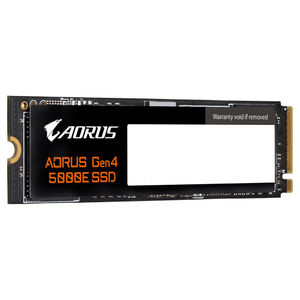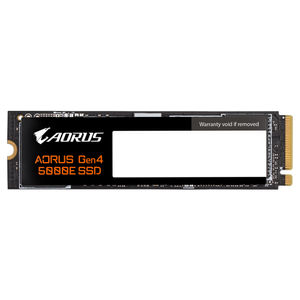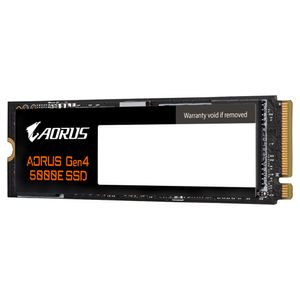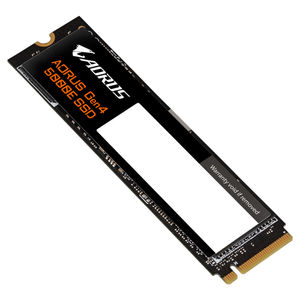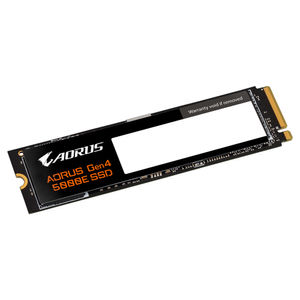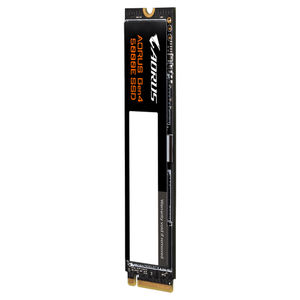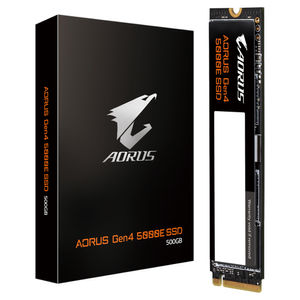Gigabyte Aorus NVMe M.2 Gen4 PCIe 5000E 500GB SSD
AG450E500G-G | GigabyteThis product has been discontinued
Features
AORUS Gen4 5000E SSD 500GB
Engineered for High-Performance Computing Needs
- PCIe 4.0 x4, NVMe 1.4 interface
- Sequential Read Speed : up to 5,000MB/s
- Sequential Write speed : up to 3,800MB/s
- HMB (Host Memory Buffer) supported
- TRIM & S.M.A.R.T supported
- Energy-efficient

Level Up Your Gaming Experience
Built with a high-quality controller and 3D TLC NAND flash, AORUS Gen4 5000E SSD delivers up to 5,000MB/s sequential read and 3,800MB/s sequential write performance. By utilizing Host Memory Buffer technology, the SSD controller can access the host DRAM without performance loss. As for features, AORUS Gen4 5000E SSD supports TRIM, SMART, and Over-Provision technologies to improve the reliability and durability of SSDs. AORUS Gen4 5000E SSD allows users to enjoy a smoother and faster gaming experience with more power efficiency.
NAND Flash Selected for High Performance
Selected High Speed 3D TLC NAND Flash (1600+ MT/s)
The ultra high speed─1600+ MT/s throughput─3D TLC NAND, are selected by critical criteria, combined with the AORUS Gen4 5000E SSD's firmware optimizations, lead to superior performance.
- NAND Flash Speed (MT/s) - 1600+ MT/s - 2X
Improve Efficiency & Responsiveness
Equipped with a robust combination of controller and new generation 3D TLC NAND, AORUS Gen4 5000E SSD delivers blazing speeds: up to 5,000 MB/s for sequential read, and up to 3,800MB/s sequential write. Sequential Read performance of PCIe 4.0 SSDs is up to 30% faster than PCIe 3.0 SSDs. AORUS Gen4 5000E SSD puts you in the computing fast lane.
- Sequential Read Speed - 5000 Performance (MB/s) - Up to 30% improved

Host Memory Buffer (HMB)
The Host Memory Buffer (HMB) feature utilizes the DMA (Direct Memory Access) of PCI Express to allow SSDs to use some of the DRAM on PC system, instead of requiring the SSD to bring its own DRAM.
* HMB feature is only supported by Windows 10 & 11
Power Saving While Operating
AORUS Gen4 5000E SSD leverages a controller which produces lower power consumption for all the high-performance computing needs. Compared with regular PCIe 4.0 x4 SSD, AORUS Gen4 5000E SSD reduces about 30% power while operating. The power consumption of AORUS Gen4 5000E SSD is notably improved.
- Power Consumption (mW) - 4200 - Reduces about 30%
SSD Tool Box
The newly updated SSD Tool Box is a software that gives users an overview of the SSD Status and various aspects such as model name, FW version, health condition and sensor temperature. Moreover, users can clear all the data with the Secure Erase function. You can download the SSD Tool Box from the link.

Quality Guaranteed
Extreme performance comes from high standard test
Specifications
| Model Number | AG450E500G-G |
| Interface | PCI-Express 4.0 x 4, NVMe 1.4 |
| Form Factor | M.2 2280 |
| Total Capacity | 500 GB |
| NAND | 3D TLC NAND Flash |
| Sequential Read speed | Up to 5,000 MB/s |
| Sequential Write speed | Up to 3,800 MB/s |
| Dimension | 80 x 22 x 2.3 mm |
| Mean Time Between Failure (MTBF) | 1.5 million hours |
| Power Consumption (Active) | Average : R : 4 W / W : 4 W |
| Power Consumption(Idle)(ASPT on) | 20 mW |
| Temperature (Operating) | 0°C to 70°C |
| Temperature (Storage) | -40°C to 85°C |
| Warranty | 1. Limited 5-years or 300TBW. 2. Limited warranty based on 5 years or 300TBW, whichever comes first. (*TBW is evaluated by JEDEC workload standard. ) *TBW (Terabyte Written): Terabytes Written is the total amount of data that can be written into a SSD before it is likely to fail. 3. When the usage of an NVME SSD as indicated by the "Percentage Used" (SMART ID: 05) in SMART page of "GIGABYTE SSD toolbox" reaches 100 means out of warranty. (A new unused product will show the number of 0) |
| Note | Test system configuration: configuration may vary by models, we will choose the latest platform for verification. Performance may vary based on SSD's firmware version and system hardware & configuration. Sequential performance measurements based on CrystalDiskMark and IOmeter 1.1.0. Speeds based on internal testing. Actual performance may vary. 1GB = 1 billion bytes. Actual useable capacity may vary. |







